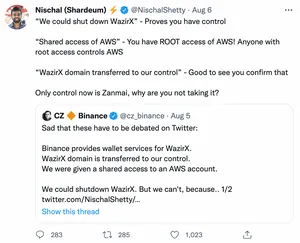Blur Finance rug pulls for over $600,000
Hotbit crypto exchange suspends trading due to criminal investigation
Hotbit announced the suspension on Twitter with a GIF of a crying Anya from the anime series Spy × Family which, despite demonstrating their good taste in shows, does not seem like it would exactly inspire confidence among customers.
CoinFLEX files for restructuring
As tends to happen with insolvent exchanges, they are hoping to "compensate" their depositors with a mix of CoinFLEX-issued tokens and equity, rather than actual money or more liquid, established cryptocurrencies.
Nuri crypto exchange files for insolvency
Their announcement began by saying, "We would like to inform you about an important development that does not affect our services, funds or investments with Nuri," and throughout the post they stressed that customer funds were safe.
Nuri blamed the insolvency on everything from "the ongoing after-effects of the Corona pandemic" to "the economic and political uncertainties in the markets after Russia's invasion of Ukraine" to the more recent crypto bear market.
On October 18, the company announced they would be shutting down after failing to find someone to acquire the company. They asked customers to withdraw their funds by December 18. Unlike many of the services that faced insolvency crises this summer, Nuri is closing without any loss of customer funds.
Curve Finance frontend compromised, $620,000 stolen but later recovered by exchanges
Curve acknowledged the apparent exploit, tweeting at the iwantmyname domain platform to say they believed the issue was on their end. Around an hour after the issue was widely noticed, Curve announced the "issue has been found and reverted", and to use the alternate Curve Finance domain until DNS changes propagated for the affected domain. They also urged users to revoke any recent contract approvals they'd made on the Curve platform.
FixedFloat tweeted that they had been able to freeze 112 of the stolen ETH (~$192,000) that had been transferred to their platform. Binance later announced that they'd recovered the remaining stolen funds, with founder CZ tweeting, "The hacker kept on sending the funds to Binance in different ways, thinking we can't catch it. 😂"
Truth in Advertising sends letters to 17 celebrities about undisclosed promotion of NFTs
The celebrities who received letters from TINA were Drake Bell, Tom Brady, DJ Khaled, Eminem, Jimmy Fallon, Paris Hilton, Eva Longoria, Madonna, Floyd Mayweather, Meek Mill, Von Miller, Neymar, Shaquille O'Neal, Gwyneth Paltrow, Logan Paul, Snoop Dogg, and Timbaland.
- "TINA.org Sends Notification Letters to Celebrities Promoting NFTs", Truth in Advertising
- "Celebrities Promoting NFTs", Truth in Advertising
At least 101 NFT Discord servers compromised in July
"Animate your Bored Ape" scammers linked to more phishing attacks amounting to more than $2.5 million
- "Scammers In Paris", Investigations by ZachXBT
Tornado Cash added to U.S. sanctions list
Tornado Cash is the most prominent cryptocurrency tumbler (or "mixer") and has been used in a multitude of instances to launder proceeds from cryptocurrency hacks and scams. In a press release, the Treasury Department named the North Korea-sponsored Lazarus Group's $625 million hack of Axie Infinity in March, the $100 million theft from Horizon Bridge in June, and the $190 million hack of the Nomad bridge in August as contributing to the decision.
Although Tornado Cash had claimed to be complying with sanctions in the wake of the Axie hack, the Treasury Department wrote in their press release that, "Tornado Cash has repeatedly failed to impose effective controls designed to stop it from laundering funds for malicious cyber actors on a regular basis and without basic measures to address its risks".
Tornado Cash is also widely used to maintain privacy in a world where transactions are publicly visible, and it remains to be seen how the cryptocurrency ecosystem will react to this major development. Tornado Cash is also relatively decentralized in its operations, meaning it may be difficult for the sanctions list to be kept up to date and for the sanctions to be enforced.
The fallout from the sanction was swift: in the days following the action, Tornado's source code repository was removed from Github and the accounts of some of its developers were suspended; the project's Gitcoin funding page was taken down; and the project's own website, governance pages, and Discord server went offline.
- Specially Designated Nationals List Update, U.S. Department of the Treasury
- "U.S. Treasury Sanctions Notorious Virtual Currency Mixer Tornado Cash", U.S. Department of the Treasury
Bitcoin mining operation Riot Blockchain earns more money in July by not mining, effectively mines without paying for power
A press release from Riot proudly announced that "Riot curtailed a total of 11,717 megawatt hours in July, enough to power 13,121 average homes for one month", as though it is acceptable that they are normally using this amount of electricity solely to churn out Bitcoins.
They also wrote that "When applied to anticipated power costs for the month, the power credits and other benefits are expected to effectively eliminate Riot's power costs for July" — meaning that Texas residents are effectively subsidizing the cost of Bitcoin mining whether they like it or not. Meanwhile, the Texas Tribune and The Dallas Morning News report that many Texans are paying 50–70% more for electricity than this time last year.
Hodlnaut halts withdrawals
In an FAQ attached to the announcement, Hodlnaut told users that "it will not be a short process" to re-enable withdrawals and token swaps.
No one wants to admit to owning the WazirX crypto exchange
Despite a 2019 blog post by Binance titled, "Binance Acquires India's Leading Digital Asset Platform WazirX to Launch Multiple Fiat-to-Crypto Gateways", Binance CEO Changpeng Zhao ("CZ") tweeted that "Binance does not own any equity in Zanmai Labs, the entity operating WazirX", and that besides wallet services and an off-chain transaction integration, "WazirX is responsible all other aspects of the WazirX exchange". These statements were disputed by Nischal Shetty, the founder of WazirX, who stated in no uncertain terms that WazirX was acquired by Binance. "Binance owns WazirX domain name. Binance has root access of AWS servers. Binance has all the Crypto assets. Binance has all the Crypto profits", Shetty wrote on Twitter.
Brand new Dragoma "move-to-earn" game rug pulls for around $3.5 million
The project launched only days before it rug pulled. On August 7, the $DMA token dropped in price over 99% as funds were removed from the project and moved to exchanges. According to CoinDesk, around $3.5 million was taken. The project's website, Telegram channel, and Twitter accounts were all taken offline.
Someone makes NFTs out of photographs from the Xinjiang Victims Database
Someone apparently decided this was perfect material for an NFT project, which they named "Made In Uyghur". They took 100 images from the database, clumsily projected them onto 3D-rendered human models in a T-pose, and listed them for $25 apiece.
Upon becoming aware of the NFTs, the Xinjiang Victims Database updated their site licensing to CC BY-NC, a Creative Commons license that forbids commercial reuse. "Commercial use of the data, including images of victims, is not okay", they wrote on Twitter, "[Made In Uyghur] never contacted us about this".
"Saxon James Musk" token developer rug pulls for around $442,000
The project developer suddenly sold off their share of the coin for around 1355 WBNB (~$442,000), sending the coin price plummeting by more than 68% as a result.
Beanstalk Farms comes back for round two after $182 million exploit
Now, Beanstalk is re-launching, saying they've made changes to their governance model and security practices, and have received audits from two major firms.
In June, the project creator stated that "The thing about a system like Beanstalk is that it works until it doesn't. You can never actually know if it works, only that it has worked so far."
Hacker compromises wallet of Steven Galanis, CEO of Cameo app, stealing $231,000
Galanis wrote on Twitter that he "Just got my Apple ID hacked". Although he didn't offer more details on how he had determined iCloud was to blame, it's likely he's referring to an attack vector where MetaMask automatically backs up users' seed phrases to iCloud unless it's disabled, meaning that a hacker who successfully accesses a person's iCloud account can also compromise any of their MetaMask wallets. The same type of attack saw a user lose $650,000 in April, and brought wider attention to the app's behavior.
Researchers identify an attack strategy actively being used by the second-largest Ethereum mining pool to earn outsized mining rewards
By manipulating the timestamps of blocks to be added to the chain, a miner can replace other miners' main-chain blocks with their own blocks, obtaining the fees that would have gone to the other miners. The attack has been called an "Uncle Maker" attack because Ethereum refers to valid but not main-chain blocks as "uncles".
F2Pool co-founder Chun Wang responded on August 8 to the allegations against his mining pool, apparently acknowledging their behavior and suggesting that manipulating a vulnerability in a system is not a "blatant disregard [of] the rules" as the researchers had characterized it. He tweeted: "We respect the *consensus* as is. If you don't like the consensus, convince [Ethereum developer Tim Beiko] to send me another Announcement and change it." Quote-tweeting a tweet by the lead author of the paper who described F2Pool's technique, he wrote, "I can't stop appreciate this elegant implementation of what we've done over the past two years... A robust system must withstand all kind of tests."
India freezes assets of WazirX, Binance's Indian exchange
The ED wrote in a press release, " ED found that large amounts of funds were diverted by the fintech companies to purchase crypto assets and then launder them abroad...(a) maximum amount of funds were diverted to WazirX exchange and the crypto assets so purchases have been diverted to unknown foreign wallets".
Ian Macalinao revealed to have pumped the total value locked on the Solana ecosystem by pretending to be 11 developers working on over a dozen projects
In an unpublished blog post where he confessed to his deception, he wrote, "I believe it contributed to the dramatic rise of SOL". He wrote the post shortly after one of his persona's projects, Cashio, was hacked for $52 million, but apparently shelved it.
Ian Macalinao's brother Dylan, the other co-founder of Saber protocol, aided in the scheme by lending credibility to Ian's various personas to those who had doubts about trusting money to projects led by pseudonymous individuals.
All told, Ian Macalinao was responsible for the Saber protocol, the Protagonist VC firm and incubator, and Ubeswap under his real name. He created Sunny Aggregator as Surya Khosla, Cashio as 0xGhostchain, Goki as Goki Rajesh, Quarry as Larry Jarry, TribecaDAO as Swaglioni, Crate as kiwipepper, aSOL as 0xAurelion, Arrow as oliver_code, Traction.Market as 0xIsaacNewton, Sencha as jjmatcha, and VenkoApp as ayyakovenko.
CoinGape and Binance publicize scam recovery address after Nomad hack
However, that was not the address that CoinGape published in their article titled "Breaking: Nomad Announces ENS Address And Bounty For Returning Funds" article, which was syndicated to Binance's news feed. Instead, they indicated that people should send funds to a different address, a scammer who had been sending on-chain messages to various people who took money out of Nomad during the exploit, asking they return it.
Although CoinGape removed the article fairly quickly, it remained live on Binance's site for over an hour. Fortunately, it doesn't appear anyone besides the writers have fallen for the scam, as no cryptocurrency has been sent to the address.
ZB crypto exchange exploited for more than $3.5 million
ZB announced that they were suspending deposit and withdrawal services due to "sudden failure of some core applications".
Robinhood cites crypto market crash in decision to lay off 23% of employees
Robinhood CEO Vlad Tenev wrote, "Since that time, we have seen additional deterioration of the macro environment, with inflation at 40-year highs accompanied by a broad crypto market crash. This has further reduced customer trading activity and assets under custody. Last year, we staffed many of our operations functions under the assumption that the heightened retail engagement we had been seeing with the stock and crypto markets in the COVID era would persist into 2022."
The announcement came the same day that Robinhood was fined $30 million by the state of New York for insufficient anti-money laundering and cybersecurity protections in the crypto portions of their offering.
Thousands of Solana wallets drained in attack that nets over $6 million
CoinShares investment firm reports $21.5 million loss from Terra collapse
- "CoinShares reports $21.7M loss tied to Terra implosion", Cointelegraph
Michael Saylor steps down as MicroStrategy CEO as the company reports a $918 million impairment charge on Bitcoin holdings
Unfortunately, that treasury strategy — which in his case also includes taking on more debt to buy more Bitcoin — is not currently working out so well for MicroStrategy, which reported a $918 million impairment charge on their Bitcoin holdings in their most recent earnings report. Saylor stepped down as CEO the same day.
Robinhood fined $30 million over lackluster cybersecurity and anti-money laundering protections in their crypto offering
Robinhood Crypto had certified to the DFS in 2019 that they were in compliance with those regulations, despite the fact that they were not. The DFS imposed a $30 million fine to the company, and also ordered them to hire an outside party to evaluate their regulatory compliance and efforts to remediate the problems with their platform.
Reaper Farm exploited for around $1.7 million
Shortly after the exploit, Reaper Farms announced they plained to raise capital via "the sale of vested $OATH tokens from our treasury with desirable terms", which would then be used alongside other assets in their treasury to compensate users.
- "Multi-Strategy Vault Post-Mortem", Reaper Farm
- "8/1/2022 Reaper.Farm Exploit Recovery Plan", Reaper Farm
Operators of Dropil crypto scam sentenced to federal prison
- "Two Orange County Men Sentenced to Federal Prison for Conning Investors Out of $1.9 Million Through Cryptocurrency Offering", U.S. Attorney's Office, Central District of California
SEC charges perpetrators of $300 million Forsage crypto pyramid scheme
Users deposited their money into projects running on the Ethereum, Tron, and Binance blockchains, and earned rewards for recruiting others to the scheme. The project also used payments from newer investors to pay out earlier investors — a Ponzi scheme.
- "SEC Charges Eleven Individuals in $300 Million Crypto Pyramid Scheme", U.S. Securities and Exchange Commission
- "SEC charges 11 people in alleged $300 million crypto Ponzi scheme", CNBC
Players in the National Women's Soccer League may be "out money" after Voyager bankruptcy
Those players have certainly learned something about crypto, as the league informed them that they're not likely to get the funds they were promised after Voyager Digital filed for bankruptcy in early July.
People rush to steal some of the $190 million in the Nomad bridge after an exploit is discovered
Nomad posted on Discord and tweeted that they were "aware of the incident" and "investigating", but the attack was ongoing over an hour after the acknowledgement.
Four days before the attack, Nomad announced that they'd raised a $22.4 million seed round from investors including Coinbase, OpenSea, and Crypto.com.
CoinFLEX cuts "significant number" of staff
- "CoinFLEX Update: July 29, 2022", CoinFLEX blog
Restructuring plans reveal Babel Finance's $225 million losses during crypto market dip
Helium caught lying that Lime and Salesforce use their network
Helium is a common name that comes up when people are pressed to provide examples of web3 use cases. The New York Times ran a feature on the company in February 2022, titled "Maybe There's a Use for Crypto After All", where Kevin Roose lavished praise on the company and wrote that they had "largely avoided the hype and inflated claims that surround many crypto projects" (oops) and repeated the false claim about a Lime partnership (double oops). Lime said that the Times never contacted them to fact-check the claim; meanwhile, Helium founder Amir Haleem prominently points people to the article with a pinned tweet.
However, a recent Twitter thread by Liron Shapira drew attention to the fact that the company's total monthly revenue from network usage is only $6,500 — raising questions about the feasibility of hotspot operators actually earning much in the way of rewards (as the rewards are distributed based on network usage).
Following the publication of Binder's article, Helium quietly removed Lime's logo from their website, along with that of Salesforce, a CRM software company. Salesforce also confirmed to The Verge that they had no partnership with Helium, and that the graphic on the Helium website where Salesforce's logo was displayed as a user of Helium was "not accurate".
Regulators order Voyager to stop saying they're FDIC insured
The Federal Reserve and the FDIC sent a cease-and-desist to Voyager, asking them to remove the misleading statements about deposit insurance. It would have been nice if this had come a bit earlier — perhaps before people had deposited money into accounts with the company and could no longer get it out.
Nirvana Finance drained of $3.5 million
The attack caused the project's ANA token to plunge in value by 80%, and the project's NIRV stablecoin to lose its dollar peg, falling to $0.08. Nirvana Finance tweeted, "Please be advised: ANA has lost its collateral, and NIRV has lost its peg. Until the thief restores funds, these tokens will not have exchange value. Be very careful with trading NIRV & ANA, as they currently have no guaranteed value."
They also tweeted at the hacker, promising to stop investigating the hacker's identity and to pay a $300,000 "bounty" in exchange for the funds back. They wrote, "You have not taken money from VCs or large funds — the treasury you have taken represents the collective hopes of everyday people."
The project had promised its users over 60% APY, and its Twitter account described ANA as "the balanced risk investment with adaptive yield".
No more Dune or DAO for the Dune DAO
The DAO has stumbled along somewhat since its January victory, encountering issues with making the bible viewable to DAO members without breaking copyright laws, a diminishing treasury due to declining crypto prices, and controversy after Soby was linked to the Remilia Collective.
After all that, the project leader suddenly and apparently unilaterally announced a plan where members could redeem their SPICE for ETH, and stated that they would be removing project leaders, converting the DAO to a private company, and selling the Dune bible (likely at a major loss). It was nice knowing you, SpiceDAO.
KuCoin announces "Anti-FUD Fund" to track down and sue critics
In his Twitter thread, Lyu outlines how the fund will "implement Anti-FUD education", "motivate and acclaim industry leaders and influencers who are always responsible, delivering trusted information", and "effectively trace FUDers who intentionally spread FUD and take legal actions against them if needed".
Something tells me his list of "industry leaders and influencers" to "acclaim" won't include those who are rightfully skeptical of crypto.
OFAC has been investigating Kraken over suspected sanctions violations
- "Kraken, a U.S. Crypto Exchange, Is Suspected of Violating Sanctions", The New York Times
CEO of Titanium Blockchain Infrastructure Services pleads guilty to securities fraud
Crypto platform Immutable lays off 17% of its gaming division staff
The fired employees quickly began preparing a legal fight against immutable, questioning whether their firing was legitimate when many of the people who were sacked were about to reach the vesting date for more than $1 million in stock options.
- "Australian crypto platform Immutable sacks 6% of staff despite plans to 'hire aggressively'", news.com.au
- "Sacked crypto unicorn staff plan legal challenge to redundancies", The Australian Financial Review
Brazilian authorities challenge NFT company Nemus after it claims ownership to land in the Amazon, allegedly pressures Indigenous people to sign documents they could not read
On July 20, they issued a press release claiming that "the World's First Non-Fungible Territory has been officially renamed by indigenous people in Brazil in coalition with Nemus". The company claims to own 41,000 hectares (~100,000 acres) of land in the Amazon.
On July 25, Brazil's Federal Prosecution Office (MPF) issued a statement that they had demanded Nemus provide proof of ownership of the areas they claim, clarification on the projects they've been promising online they would undertake, and proof that they've received authorization by the National Indian Foundation (FUNAI) or any other public body that would allow them to operate in the area and engage with various Indigenous groups.
According to the MPF, members of Indigenous groups in the area reported the company had violated their rights. They also explained that Nemus had expressed to them their plans to use heavy machinery to open an airstrip and build a road in order to access Brazil nut groves in the area. Apurinã leaders alleged that company representatives had pressured Indigenous people who do not read well to sign documents, and did not provide them with copies.
- "MPF aciona empresa que vende ativos digitais (NFTs) de áreas da Amazônia", Ministério Público Federal (in Portuguese)
- Press release by Nemus
After five years in prison for a Ponzi scheme and a lifetime ban from the pharmaceutical industry, Martin Shkreli announces his new venture: a web3 drug discovery platform
In 2018, he was sentenced to federal prison for unrelated securities fraud; a U.S. Attorney stated he "essentially ran his company like a Ponzi scheme". He spent five years in prison, and was released in May 2022.
Shkreli is also banned from the securities industry, and from serving as an officer or director of any publicly traded company.
If this was anyone other than Martin Shkreli, I might have been surprised to hear that, only a little over two months out of prison and while still staying in a halfway house, Shkreli is launching a "web3 drug discovery software platform".
- "Announcing Druglike - a Web3 Drug Discovery Platform", press release
- Martin Shkreli, Wikipedia
$4.5 million taken from Teddy Doge project in apparent rug pull
Although the project admins blamed the theft on an outside attacker, writing on Telegram that they were "not certain whether it is a bug in our cross-chain bridge or a leaked developer wallet", that is a common refrain by developers who rug pull their own projects.
Attacker makes off with $1.1 million after successful governance attack on the Audius web3 music platform
Audius halted the token and smart contracts while they patched the bug, and brought the network back online shortly afterward. The attacker had found and exploited a vulnerability in the way the contracts were written which allowed them to rewrite the governance voting rules and delegate 10 trillion AUDIO tokens to themselves for voting purposes. They then used those tokens to pass the malicious proposal. The contracts had been audited by OpenZeppelin and Kudelski, but neither group caught the vulnerability. Audius stated that a plan for dealing with the loss of community funds was still under discussion.
GameStop's new NFT platform features an NFT mimicking a victim of 9/11
One of their artists, "Jules", created an NFT clearly modeled after The Falling Man, a well-known photograph of a man falling from the upper floors of the World Trade Center during the September 11 attacks in New York City. The NFT is also titled Falling Man, and pictures a model in the same position, but wearing an astronaut suit.
Not only is GameStop selling an NFT of the victim of a tragedy, it's a featured image when Googling "GameStop".
- "Falling Man", GameStop NFT
- The Falling Man, Wikipedia
Celsius customers send letters to the judge in the bankruptcy case
Many customers write of being convinced by Alex Mashinsky personally, particularly in his weekly "AMA"s where he regularly claimed that Celsius was a safe platform with substantial reserves that could cover any potential losses. Mashinsky often denigrated traditional banks, referring to Celsius as a better and safer option.
Some of the letters are particularly heartbreaking, with customers referring to suicidal ideation or saying that they've been too ashamed to share the news of their financial losses with their family. One woman included a copy of an email she sent to Mashinsky and Celsius support, pleading for them to allow her access to her crypto, and including an ultrasound photo of a baby. "I do need the fund to pay for the hospital, doctor and baby items such as cot, clothes, nappies etc. I also need the fund to pay for school fees for my two other school aged children," she wrote.
Founder of My Big Coin convicted of $6 million crypto fraud
- "My Big Coin Founder Convicted of Cryptocurrency Fraud Scheme", U.S. Attorney's Office of the District of Massachusetts
Former Coinbase product manager charged with tipping off co-conspirators about tokens that were about to be listed on the exchange
Wahi allegedly used his access to highly confidential information around which cryptocurrency tokens would be listed and when the news would be announced to tip off his brother and friend, who would then use multiple anonymous Ethereum wallets to purchase large quantities of the token before the prices spiked on the news. According to the press release, the two took positions in at least six tokens before Coinbase announced in April 2022 that they would be listing them on the exchange. The DoJ said that the scheme had generated approximately $1.5 million in gains. The DoJ acknowledged a "Twitter account that is well known in the crypto community", likely referring to Cobie, who identified the suspicious activity.
The DoJ also reported that when Coinbase's director of security operations contacted Wahi in May asking him to attend a meeting regarding the suspicious activity, Wahi purchased a one-way flight to India in an attempt to flee the country. He was stopped by law enforcement.
The U.S. Attorney for the Southern District of New York stated in the press release, "Today's charges are a further reminder that Web3 is not a law-free zone... fraud is fraud is fraud, whether it occurs on the blockchain or on Wall Street."
Each of the charges (four against Wahi, two each against his brother and friend) carried a maximum sentence of 20 years. In May 2023, Ishan Wahi was sentenced to two years in prison; Nikhil was sentenced to ten months in prison.
- "Three Charged In First Ever Cryptocurrency Insider Trading Tipping Scheme", U.S. Department of Justice
- Indictment









































![Correspondences of my email sent to support on 15 Jun 2022: To: support@celsius.network Cc: ceo@celsius.network Dear Alex and Celcius support, I am writing this email to ask for your special consideration to allow me to make a small withdrawal on my BTC held in Celcius. I understand that Celsius made the decision to pause withdrawals in a volatile market condition, but do hope that you review my case and give me special permission. I am 5.5 months pregnant with my third child. I am expecting to give birth in early October and I do need the fund to pay for the hospital, doctor and baby items such as cot, clothes, nappies etc. I also need the fund to pay for school fees for my two other schools aged children. I have attached a recent scan of my baby and a letter from my obstetrician confirming my pregnancy and planning for admission into the hospital. Scan of my baby that am carrying: [ultrasound photo of a fetus]](https://primary-cdn.web3isgoinggreat.com/entryImages/resized/celsius-doc104_300.webp)
